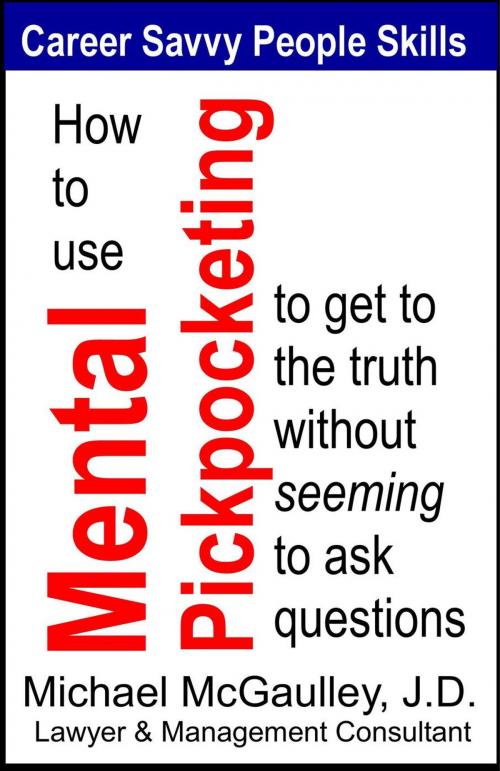How to Use Mental Pickpocketing to Get to the Truth Without Seeming to Ask Questions
Career Savvy People Skills, #2
Business & Finance, Human Resources & Personnel Management, Career Planning & Job Hunting, Nonfiction, Health & Well Being, Self Help, Self Improvement| Author: | Michael McGaulley | ISBN: | 9780976840695 |
| Publisher: | Champlain House Media | Publication: | February 16, 2018 |
| Imprint: | Language: | English |
| Author: | Michael McGaulley |
| ISBN: | 9780976840695 |
| Publisher: | Champlain House Media |
| Publication: | February 16, 2018 |
| Imprint: | |
| Language: | English |
KNOWLEDGE IS POWER . . . BUT NOT EVERYONE WANTS TO SHARE
Knowledge is power . . . particularly in organizations and teams where your success depends in large part on career-savvy subtle communication skills and other people skills at work–particularly your ability to ferret out semi-hidden information, and to discern the deeper reality behind situations and events taking place around you.
It’s easy enough to ask questions, and most of the time most of the people will do their best to share the truth. But not always. Sometimes, if you play it straight and ask direct questions, you won’t get straight answers, and you won’t get to the truth–instead, you’ll get distortion, “spin” and responses that are somewhat less than the whole truth.
Sometimes simply to ask a question is to give the game away because it alerts the other person to what you’re really after, and hence flags what they may want to fudge, avoid, or distort.
WHAT IS “MENTAL PICKPOCKETING”?
In those situations, how do you get information–and get the truth–without flagging what you’re really after? By employing mental pickpocketing– the art and science of asking questions without seeming to ask, or without seeming to ask what you’re really after
.
BY READING THIS BOOK YOU WILL LEARN:
In this book, written by a lawyer and management consultant, you will learn . . .
* 15 “other” reasons to ask questions, apart from getting information;
* 10 basic tips on “information scavenging”;
* 6 key factors in sequencing your questions and probes;
* 6 ways of “listening” while really asking and re-asking;
* 4 “nice” ways of mental pickpocketing;
* 7 “tricky” methods mental pickpockets use to subtly get truthful answers;
* 6 “even trickier” ways in which mental pickpockets operate;
* Subtle ways of changing pace, changing directions, and even discouraging the all-too-talkative;
* Methods of controlling the discussion–and the flow of words–when the other person is off-the-point, or telling you a lot more than you need to know;
* A variety of ways of “listening” with your eyes.
* An array of what’s termed “soft skills” and subtle interpersonal skills.
YOU WILL ALSO LEARN TO PROTECT YOURSELF AGAINST MENTAL PICKPOCKETS!
For your self-protection–you’ll find here a variety of “antidotes” to mental pickpocketing, including 14 ways of NOT answering questions and subtle probes.
KNOWLEDGE IS POWER . . . BUT NOT EVERYONE WANTS TO SHARE
Knowledge is power . . . particularly in organizations and teams where your success depends in large part on career-savvy subtle communication skills and other people skills at work–particularly your ability to ferret out semi-hidden information, and to discern the deeper reality behind situations and events taking place around you.
It’s easy enough to ask questions, and most of the time most of the people will do their best to share the truth. But not always. Sometimes, if you play it straight and ask direct questions, you won’t get straight answers, and you won’t get to the truth–instead, you’ll get distortion, “spin” and responses that are somewhat less than the whole truth.
Sometimes simply to ask a question is to give the game away because it alerts the other person to what you’re really after, and hence flags what they may want to fudge, avoid, or distort.
WHAT IS “MENTAL PICKPOCKETING”?
In those situations, how do you get information–and get the truth–without flagging what you’re really after? By employing mental pickpocketing– the art and science of asking questions without seeming to ask, or without seeming to ask what you’re really after
.
BY READING THIS BOOK YOU WILL LEARN:
In this book, written by a lawyer and management consultant, you will learn . . .
* 15 “other” reasons to ask questions, apart from getting information;
* 10 basic tips on “information scavenging”;
* 6 key factors in sequencing your questions and probes;
* 6 ways of “listening” while really asking and re-asking;
* 4 “nice” ways of mental pickpocketing;
* 7 “tricky” methods mental pickpockets use to subtly get truthful answers;
* 6 “even trickier” ways in which mental pickpockets operate;
* Subtle ways of changing pace, changing directions, and even discouraging the all-too-talkative;
* Methods of controlling the discussion–and the flow of words–when the other person is off-the-point, or telling you a lot more than you need to know;
* A variety of ways of “listening” with your eyes.
* An array of what’s termed “soft skills” and subtle interpersonal skills.
YOU WILL ALSO LEARN TO PROTECT YOURSELF AGAINST MENTAL PICKPOCKETS!
For your self-protection–you’ll find here a variety of “antidotes” to mental pickpocketing, including 14 ways of NOT answering questions and subtle probes.















